
Is the Nyquist Sampling Rate Satisfied? (Homework Problem)
In this blog I answer a question I received about how to apply Nyquist’s sampling rate mathematically and thought it’s worth sharing. One of the difficult parts about getting started in DSP is the concepts are not intuitive which is further compounded by the requirement that the early work must done mathematically, rather than by building or simulating. Take heart if you feel this way, you are not alone! I hope this blog is useful in helping to understand the mathematics of DSP. Please leave a comment below with other questions you have.
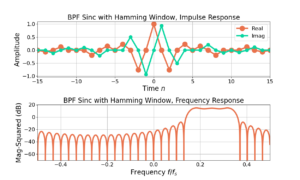
Designing FIR Filter Gain
This blog describes how to design the FIR filter gain through normalization and then applying a gain. Applying filter gain may be desirable to setting the proper amplitude level or power level needed for follow on processing based on threshold values or other reference levels.
Filter design methods may create different gains for the resulting filters such as with Remez, using windowed sinc functions or as specially designed pulse shaping filters. Normalizing the magnitude response of an FIR filter makes the gain 1, or 0 dB, at a desired frequency. A gain factor can then be applied by scaling each of the filter weights.

Can the Fourier Transform Magnitude Be Negative?
I came across a question on DSP Stack Exchange the other day: can the Fourier Transform magnitude be negative? This is a great question! The answer is no, and let’s take a look at why.
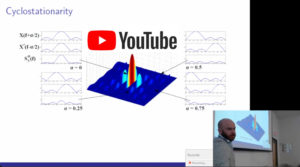
Wave Walker DSP YouTube Channel
I started a YouTube channel! My first video is a lecture I gave as a PhD student at Virginia Tech. Be on the lookout for
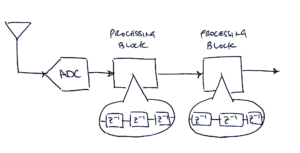
Minimizing Filter Length: Explaining Why
Longer filters create a bottleneck in a DSP assembly line. Minimizing filter length reduces the size of the bottleneck which allows the receiver to run at a faster sampling rate and therefore process more bandwidth. Minimizing filter length is important because it minimizes the number of multiplies that have to be performed. Multiplication can be slow and cause a heavy computational load.

New GNU Radio Beginner Tutorials!
The new GNU Radio Tutorials are live! Check them out here: https://wiki.gnuradio.org/index.php?title=Tutorials A big thank you to NumFOCUS for sponsoring the work and to Marc
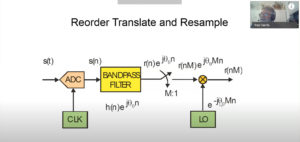
fred harris on Channelizers Video
I came across a video of fred harris talking about his latest channelizer designs from April 2021. It’s a great talk and worth your time. Watch the video on YouTube here.
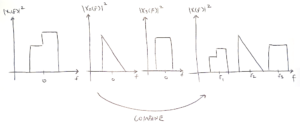
Why are Filters used in DSP?
Much is said in an undergraduate education about how to design filters but not how to apply them. I never felt as if I got a great answer to the question: “why are filters used in DSP?”, so in this blog post I’ll answer that question with the four ways I have found them to be applied:
- Destroy: Remove elements from a signal
- Modify: Apply a desired effect to a signal
- Isolate: Separate signals from one another
- Combine: Combine multiple signals together

Self Promotion: Engineer’s Worst Fear (Yikes!)
One of the things I struggled with while I was younger was self promotion: talking about my accomplishments, writing a resume, and giving presentations on my work. It felt strangely boastful. I’d ask myself the questions, “why do I have to tell everyone what I’m doing?” and “can’t they see how hard I’m working and all the great work I’m doing?”
Have you ever felt like this?
Talking about yourself and your accomplishments is part of being an engineer in the same way you’re expected to show up at work on time, attend team meetings and respond to emails.
In this post I talk about the proper mindset needed for talking about yourself, how everyone else feels about it and how you can do it honestly.

GNU Radio Tutorials: Half-Way Review
Go to the tutorials here: https://wiki.gnuradio.org/index.php/NewTutorialReview
I was selected to update the GNU Radio tutorials, sponsored by NumFOCUS.org (Thank You!). I’ve reached the half-way point on the contract and have paused until Thursday, January 20th to allow for reviews and comments on the progress made so far. The new tutorials can be found on the NewTutorialReview page on the GNU Radio wiki.
Highlights:
- 11 new tutorials (What is GNU Radio? and Installing GNU Radio are not new)
- 160 images
- Navigation menu connecting all new tutorials